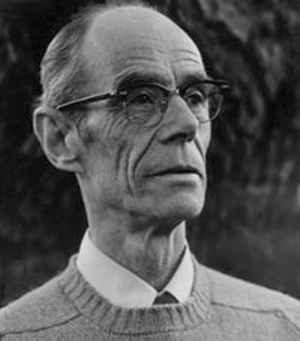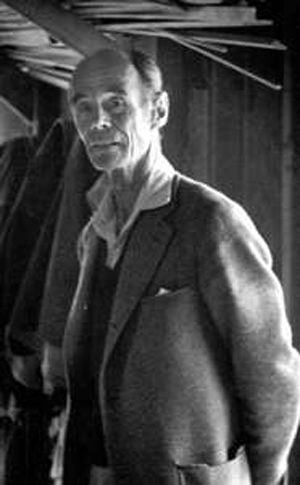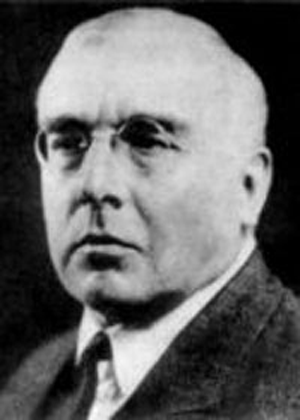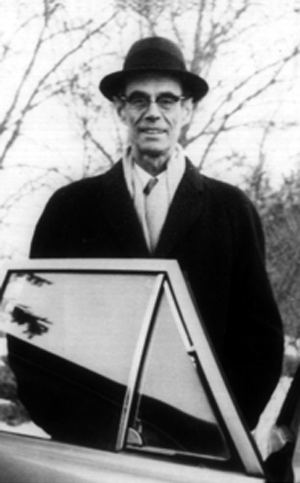John Pentland, 1907–1984
by Gurdjieff International Review
NOTICE: THIS WORK MAY BE PROTECTED BY COPYRIGHT
YOU ARE REQUIRED TO READ THE COPYRIGHT NOTICE AT THIS LINK BEFORE YOU READ THE FOLLOWING WORK, THAT IS AVAILABLE SOLELY FOR PRIVATE STUDY, SCHOLARSHIP OR RESEARCH PURSUANT TO 17 U.S.C. SECTION 107 AND 108. IN THE EVENT THAT THE LIBRARY DETERMINES THAT UNLAWFUL COPYING OF THIS WORK HAS OCCURRED, THE LIBRARY HAS THE RIGHT TO BLOCK THE I.P. ADDRESS AT WHICH THE UNLAWFUL COPYING APPEARED TO HAVE OCCURRED. THANK YOU FOR RESPECTING THE RIGHTS OF COPYRIGHT OWNERS.
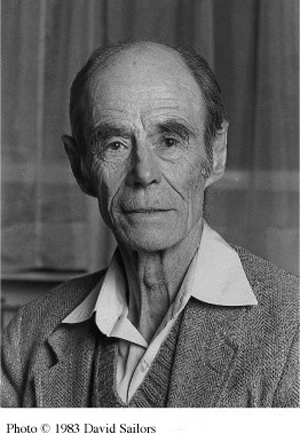
Lord Pentland (Henry John Sinclair) was a pupil of Ouspensky for many years during the 1930s and 1940s. He began to study intensely with Gurdjieff in 1948. Gurdjieff then appointed him to lead the Work in North America. He became president of the Gurdjieff Foundation when it was established in New York in 1953 and remained in that position until his death.
Lord Pentland
A brief sketch of John Pentland’s life and writings by J. Walter Driscoll. Pentland was a pupil of both P. D. and Mme. Ouspensky for many years during the 1930s and 1940s. He spent considerable time with Gurdjieff in 1949, after which he led the Gurdjieff Work in North America.
John Pentland, 1907–1984
by J. Walter Driscoll
Copyright © 1997 J. Walter Driscoll
Lord Pentland (Henry John Sinclair) was a pupil of both P.D. and Mme. Ouspensky for many years during the 1930s and 1940s. He spent considerable time in 1949, the last year of Gurdjieff's life, with him; then he led the Gurdjieff Work in North America. He described this period in Transmission: an interview with Lord Pentland in 1983:When I met Gurdjieff I'd been quite a few years with Mr. Ouspensky and Mme. Ouspensky both attending talks and lectures and also living in Mme. Ouspensky's house, in their houses in England in the west of London and in New Jersey. And it was after Ouspensky died and I went out to India, and on the way back, actually, it became clear to me that even all those years with Ouspensky, I hadn't arrived at anything; I came to nothing. And it was then that through Mme. Ouspensky's introduction, I went to Paris and met Gurdjieff. I was with him in Paris and then I came to New York. And it was a short period, only about nine months, but a couple of months after that he died. And the way he left things, it made it perfectly easy for me to have to really enter into a position of responsibility as such. So it made it essentially easy for me to try to understand more deeply what he'd shown me.
With support from other senior students, Lord Pentland became president of the Gurdjieff Foundation when it was established in New York in 1953 and remained in that position until his death in 1984. He played a major role in bringing English editions of Gurdjieff's and Ouspensky's books to publication. He also collaborated in the founding of Gurdjieff societies in major urban areas across North America. Lord Pentland was president of the Gurdjieff Foundation of California from its inception in 1955.
As executive editor of Far West Editions between 1969 and 1984 he supervised and was a frequent but anonymous contributor to ten issues of Material for Thought, an occasional magazine of anonymously authored reviews, essays, interviews and poetry that is dedicated to "the inner search for one's self." In this capacity, he acted as editorial advisor to numerous authors and wrote forewords to some of their books published by Far West Editions. As founder of the Far West Institute, he was a pivotal force behind their biennial program of six public lectures in San Francisco between 1974 and 1984. These drew a wide range of gifted speakers, from many vocations and traditions, to penetrating dialogues on their search for meaning in the midst of contemporary materialism. Lord Pentland was a frequent contributor to these discussions.
Guidance Under Lord Pentland’s Direction
Working under Lord Pentland’s guidance for almost 30 years, Don Hoyt shares some of his experiences with Pentland, “not only in the context of group exchanges with him, but also in what can only be described as ‘teaching moments’.”
Guidance Under Lord Pentland’s Direction
by Don Hoyt
Within the various Gurdjieff Foundations here in America a number of us who worked directly under the guidance of Lord Pentland can recall vividly how the power of his unique insights into the teaching of Gurdjieff acted as a catalyst that opened up new avenues of questioning for us, of penetrating beneath and beyond the level of associative expectations, in a way that kindled—and sometimes ignited—a deepening awareness of our essence. This was brought home for me not only in the context of group exchanges with him, but also in what can only be described as “teaching moments,” in which, while in his presence, a word from him, an unexpected reminder, would produce in us a shock, shaking us out of the dream state in which we had become entrapped.
Lord Pentland, circa 1980
Lord Pentland was a true teacher in every sense of the word. There was an unmistakable impression of inner authority that emanated from his presence which spoke of a lifetime of payment, and which accounts in large part for the atmosphere that was generated in our meetings with him, an atmosphere charged with electricity. I’ve often pondered what it was that produced this effect, and I’ve come to realize that it may have been his complete indifference to any concern about what impression he might be making, or in expounding some idea for our edification. Yet another factor was at work. He was working—working with total attentiveness and presence that enabled his attention to be freely and wholly available, unencumbered by any inventory of “prior knowings.” One felt he was listening from a respectfulness for our work that had an action on us, of a demand, a demand to share in that quality of attentiveness with him, to the extent we were able.
A question arises from this—a question implicit within the state of our listening. Why was it that our attention repeatedly fell short of the potency, the inner force, required to maintain the sustained level of attentiveness to which he was calling us? In a message from him that was read aloud at the beginning of a Sunday of work, he addressed this very question. He began by drawing our attention to an unexpected factor in our general makeup, namely, that:A part of my energy is detached from my present state. Whether I am trying to be quiet, or struggling with some unpleasant emotion, this part of my presence is unconcerned, detached from it all. I am oblivious of the fact that this free energy is part of me. I am only partly present. But when, through the work of a sustained attentive inner listening, I become aware of this detached energy, accepting the fact that I cannot even be sure I know to whom this unattached energy belongs or what it means—that this “unknowing” elicits a state of presence accompanied by a relaxation of the body, particularly in the neck and shoulders, and a sense of warmth in the solar plexus region. All the restlessness disappears as the free energy finds a place in the body where it can naturally relate to other inner energies.
This perspective was further brought home for us during one of Lord Pentland’s last formal exchanges, this one with the Cave Junction, Oregon group in August of 1983, six months before his death. He had been invited by George Cornelius, who had asked Lord Pentland if he would speak about what needs to be understood if we are to undergo the real work that Gurdjieff has opened up for us.George Cornelius was a student of Gurdjieff in Paris, where Mr. Gurdjieff called him "The American."
George Cornelius also studied with P.D. Ouspensky, J.G. Bennett, Jane Heap and Rodney Collin.
Mrs. A.L. Staveley called Mr. Cornelius, "formidable" and "a strong meat -- not for everyone." She said that Mr. Cornelius worked with those who had no group and who found it difficult to work within a group.
George Cornelius said, "I teach discrimination" and drove away many who came to him. A friend of John Pentland and John Lester, George Cornelius was sent by many as a man, who kicked down doors, rode across boundaries and stepped on corns.
-- George Cornelius, by Gurdjieff Club
It was an occasion in which Lord Pentland began to articulate with extraordinary precision what can guide our work when we are prepared to move beyond the level of conceptual assumptions about what we regard as inner work. He began by introducing an altogether unfamiliar dimension of meaning to the word responsibility, a dimension that could be a guiding imperative to a real work. His words still vibrate with the same potency for me now as they did then.I begin to understand what would be meant, if I were able to be present to it, by the idea of two levels of attention: one that reacts to what is going on mechanically and another attention that is in touch with the presence of myself in the moment. Real responsibility begins when I am present to both these levels at the same time—when I have an attention which is able to hear the call at the same time as it feels the movement of the unconscious parts of myself.
Now of course I’m speaking about something you’re all familiar with. It’s the question of real will. And I hope I can say that we’re all together in front of that question, yourself, and myself, and all of us. It’s a question we all share together. Nobody’s giving the answers. And that’s what a real human question is like.
The first step in responsibility, then, is separation—separation of the energies from the forms they take, separation of essence from personality. And for this process to go on calls for a certain quality of attention which I call non-directive skill. It’s only by developing this quality of attentive engagement that I begin to move towards real individuality.
On first hearing this idea of non-directive skill, it did not fully register. Time would be needed for it to gestate, to “cook” in us, to where it would become a living imperative for our work. In recognition of this, Lord Pentland made no further attempt to explain or define what was meant by this idea of non-directive engagement of the attention, as though trusting that this idea, like a seed, would germinate in us to eventually bear fruit within the context of our work, and instead, shifted the ground of our exchange to encompass another scale altogether, to that of the idea of octaves with their intervals.You are all familiar with the idea, Gurdjieff’s idea, of the octave, as it develops sequentially in time. It’s very good to experience the law of octaves as a law not only behind the big crises, but behind every little detail of our lives, observing the energies that arise, that go out from me, and return. But we also need to begin to try to understand the law of octaves vertically, in which all the notes are there, all the levels are all there at the same moment within me, and what we wish for is to experience these levels and to observe the separation of their different energies—distinguishable one from the other—each of which has its own characteristic rate of vibration.
Yet even here, the sweep and resiliency of Lord Pentland’s mode of exchange opened us to a far wider horizon, in which the level of our work could be viewed in juxtaposition with the awesome scale of cosmological movement, the movement of the great Ray of Creation, which, as he pointed out, obeys the same laws as those that apply to the scale of our inner work.We don’t understand the importance of our attitude. My attitude at any point is like the sunken part of the iceberg. I start out from the conscious affirmative part which is like the tip. I’m quite surprised—and unprepared—to meet resistance from this unconscious part. Yet my attitude is largely governed by this resistance. You have to see the resistance. You have to be more aware of the wish to not work—at the same time as you are holding the wish to work.
What was implicit for me in these words was the simultaneous awareness of both these forces—the force of affirmation and the force of denial. It is the simultaneous holding within our awareness of both these two forces which draws us into the presence of the third force—the all-embracing force of reconciliation.
This lawful factor within the context of our work was further illuminated at an impromptu informal gathering arranged with little forewarning by Lord Pentland during an intensive work period in 1983, four months before he died. He chose to dispense with any note-taking or recording of the meeting, yet his words still resonate strongly in my recollection. He began speaking almost immediately.The association of wishing to be silent is seen when I close the eyes, that all too easily this becomes an automatic reflex that I do out of fear of the outside world. It is this fear that creates the aggression which creates the inner noise. But what we wish for is a listening that will be for the whole of the inner and outer life, all together—and somewhere between certain limits there will be a particular point where the whole of life is available, and at that point there will be a silence, and it will appear as part of a lawful process in which there is no violence, because I’m simply coming to a more and more sensitive state of attentive listening.
So here again we were brought in touch with a work that includes both sides at once.
A remarkable quality of Lord Pentland’s way of responding to a question or observation that he clearly could see was the fruit of a genuine inner place of work, is that he invariably honored the occasion by illuminating for that individual a level of meaning that opened them to a whole new scale of understanding—of the very question or observation they had brought. I vividly recall an instance of this which took place in the context of a group meeting where this occurred. This was the observation put to Lord Pentland.A week ago during the reading of Beelzebub there was a part about all-embracingness. It touched me and I wanted to understand why. I tried to keep the question open during the day. Also it has been with me for a week, because I tried to understand why I felt this was missing in my work and why I didn’t feel it.
Lord Pentland’s response:All-embracingness—it’s for that that the work to come to the work of sensation is given. We have to see first of all in moments and then for longer, that through the work to be aware of the sensation of the whole of my body, there can be moments when all the experiences are contained in myself—they don’t go outside myself.
I need to come back to the work of sensation because the container is coated in me through the transformation of my energies. And this transformation cannot take place at the level of my functioning—the forms that this energy takes. As long as I’m taken by that level, there can be no transformation. So I begin to discover through the work of sensation that I can be aware of energy and vibration before they have taken form. And this is the first step towards that transformation by which a container could exist for my inner life, which would give me the opportunity to study the appearance of the forces that act through these energies.
I’ve often reflected on what was Lord Pentland’s fundamental aim as a teacher—what was he after? One response to this is that his abiding intent, almost passion, was to arouse in us an awareness of the buffers—the built in forms of resistance—that distance us from the possibility of “hearing,” of being receptive to new impressions. Keenly aware of the dream state in which we live our lives, he knew all too well that any reference to “sleep” would elicit little more than a yawn, that it has become a cliché term at best. Yet at unexpected moments, he could touch our conscience by reminding us that what we are in fact asleep to is the reality of our being, asleep to levels of this being that are free of, and inaccessible to, the machinations of the personal self with its dreams of self-enhancement and self-ascendance.The main point of any spiritual practice is to step out of ego's constant desire for a higher, more transcendental version of knowledge, religion, virtue, judgment, comfort, or whatever it is that the particular ego is seeking.
-- Chogyam Trungpa, From Cutting Through Spiritual Materialism
Yet there are those who have come to realize that the price of coming to a real work is disenchantment with all of that, and it is these whom Lord Pentland endeavored to reach.Then we look further and further and further. We don't make a big point or an answer out of any one thing....
We go on deeper and deeper and deeper and deeper, until we reach the point where there is no answer. There is not even a question. Both question and answer die simultaneously at some point. They begin to rub each other too closely and they short-circuit each other in some way. At that point, we tend to give up hope of an answer, or of anything whatsoever, for that matter. We have no more hope, none whatsoever....
This hopelessness is the essence of crazy wisdom. It is hopeless, utterly hopeless. It is beyond hopelessness....
Without a sense of hopelessness, there is no way to give birth to sudden enlightenment. Only giving up our projects brings about the ultimate, definite, positive state of being, which is the realization that we are already enlightened beings here and now.
-- Crazy Wisdom, by Chogyam Trungpa
In 1955, Don Hoyt became a member of the Gurdjieff Foundation under the guidance of Lord Pentland. After Lord Pentland’s death in 1984, Don Hoyt served as President of the Gurdjieff Foundation of California until 1988.

